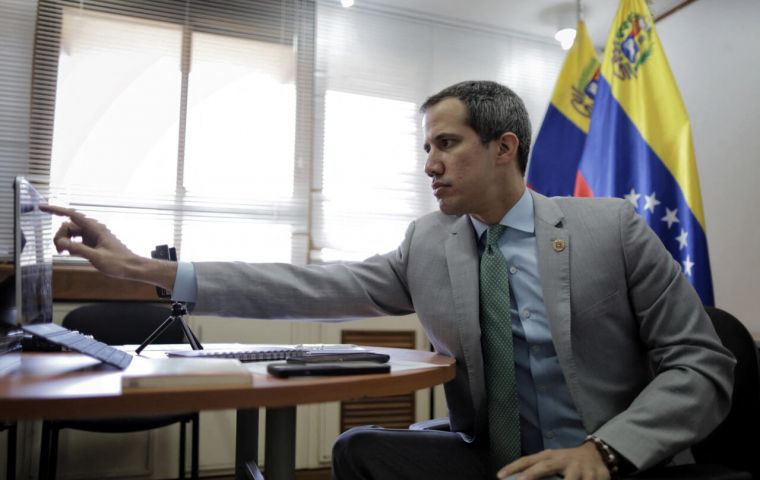MercoPress. South Atlantic News Agency
Guaidó's role as Venezuelan acting president comes to an end
 Guaidó ceases to be Venezuela's acting president on Jan. 5 after failing to achieve most of the goals entrusted to him
Guaidó ceases to be Venezuela's acting president on Jan. 5 after failing to achieve most of the goals entrusted to him The office of “acting president” of Venezuela once entrusted to opposition leader Juan Guaidó was suppressed as of Jan. 5 by the same assembly that chose to create it in 2019.
A majority of former parliamentarians ratified this decision Friday during a virtual meeting, while a small group was against the measure. The measure was adopted by 72 votes in favor, 29 against, and eight abstentions.
At the same time, the group voted in favor of keeping the 2015 National Assembly active only to legislate about Venezuela's interests abroad which had been until now run by the so-called “interim government.”
Guaidó's supporters described the elimination of this figure as a “legal magnicide,” while the future former Acting President had tried to retain his title, which had become more and more honorific over time, by calling the political leaders to act above “names and personal interests.”
The so-called interim government, with no real power within Venezuela, had the recognition of the United States and a small group of countries, which allowed it to control some public resources abroad. In order to continue with this policy, the former insurgent lawmakers ratified the ad-hoc boards that handle matters of the state-owned oil company PDVSA and the Venezuelan Central Bank abroad.
Guaidó had adjourned until Jan. 3 a final decision but to no avail. He had been elected by Venezuela's parallel Legal Assembly on Jan. 5, 2019, on the grounds that Nicolás Maduro had retained his position through rigged elections in 2018. Nearly 50 countries, including Brazil under Jair Bolsonaro and Argentina under Mauricio Macri recognized Guaidó as the legitimate president of Venezuela and severed all ties with the PSUV administration in Caracas.
But after Guaidó's failure over the years to become the Venezuelan Charles De Gaulle and Maduro gaining international momentum to the point of planning a meeting with France's Emmanuel Macron following their encounter at Cairo this year, the opposition no longer regards Guaidó as the man to rescue the oil-rich South American country from the hardships of socialism.
The opposition assembly continues to function in a parallel and symbolic way, even though its mandate ended in 2021 and Maduro regained control of the new assembly elected in 2020.
Venezuela has already resumed ties with Colombia and Argentina, and is about to go through the same path with Brazil after Luiz Inácio Lula Da Silva takes office on Jan. 1. Spain has appointed a new ambassador to Caracas, and the US administration of President Joseph Biden even negotiated directly with Maduro's government the purchase of oil following Russia's invasion on Ukraine. All these actions were detrimental to Guaidó's role.




Top Comments
Disclaimer & comment rulesCommenting for this story is now closed.
If you have a Facebook account, become a fan and comment on our Facebook Page!